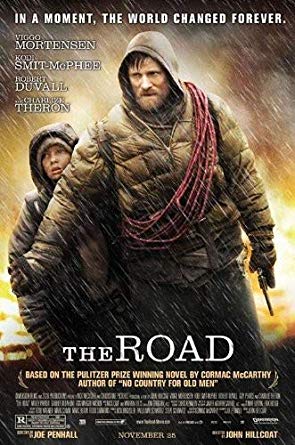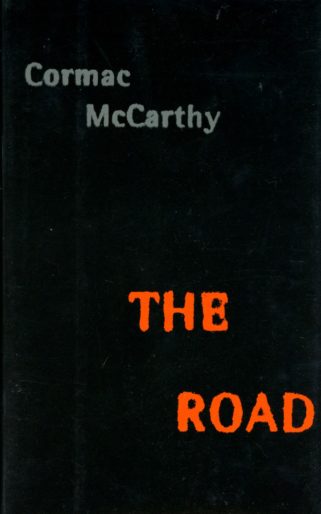 In recent weeks a standout 2009 film was released on DVD: THE ROAD. Directed by John Hillcoat (with likely postproduction “assistance” by financier/distributor Harvey Weinstein) and starring Viggo Mortensen and Robert Duvall, it was adapted from the 2006 bestseller by Cormac McCarthy. That novel was a profoundly bleak evocation of a nuclear war-ravaged landscape traversed by a desperate man and his young son, enlivened by McCarthy’s ultra-spare prose.
In recent weeks a standout 2009 film was released on DVD: THE ROAD. Directed by John Hillcoat (with likely postproduction “assistance” by financier/distributor Harvey Weinstein) and starring Viggo Mortensen and Robert Duvall, it was adapted from the 2006 bestseller by Cormac McCarthy. That novel was a profoundly bleak evocation of a nuclear war-ravaged landscape traversed by a desperate man and his young son, enlivened by McCarthy’s ultra-spare prose.
Hillcoat’s film, minor changes aside (a bit from the book involving babies roasted over an open fire has been excised, and the movie’s ending is far sappier than McCarthy’s), is quite faithful to the book. This means a profoundly bleak viewing experience, and a film that flopped spectacularly with critics and audiences. That’s despite the fact that it’s a fine movie with terrific performances (Charlize Theron isn’t even bad in the flashbacks) and a superbly rendered post-apocalyptic landscape that ranks among the finest ever seen onscreen.
The immediate reasons behind the film’s failure are obvious. In true Weinstein fashion its release was held up for over a year, apparently so it could be fussed over a la KILL SHOT. That disastrous film was a Weinstein production supposed to have been released back in ’06 that was subjected by Mssrs. Harvey and Bob to a torturous postproduction cut-a-thon that resulted in one pivotal character being excised, its executive producer Quentin Tarantino removing his name from the credits and its star Diane Lane publicly distancing herself from it—and the film debuting on DVD to little fanfare in 2009. THE ROAD’S much-postponed release was similarly truncated, with its extended postproduction ensuring that the film appeared long after the heat generated by the novel (and also the Oscar winning 2007 adaptation of McCarthy’s NO COUNTRY FOR OLD MEN) had died down.
The overall response to THE ROAD was as grim as its subject matter. That seems a little odd to me, as the book was a nationwide bestseller and a selection of the Oprah Winfrey book club. Yet the universal verdict appears to be that the film was too dark and/or depressing.
That’s hardly the first instance of a film adaptation of a beloved book getting less than effusive reception. THE HOUSE OF  SAND AND FOG by Andre Dubas III was such a popular novel that Dubas was allowed to personally oversee the screen adaptation. The 2004 film that emerged was, aside from an altered conclusion, quite faithful to the novel and a terrific piece of work in its own right, yet tanked with critics and audiences—like THE ROAD, the most common criticism leveled at THE HOUSE OF SAND AND FOG the film was that it was too depressing. The expensive independent co-production BLINDNESS from 2008 was given a similar reception, despite the fact that it too was adapted from an extremely well-received novel. We can also include the aforementioned NO COUNTRY FOR OLD MEN (even though it was a minor box office success), which replicated its bestselling source novel’s every beat, down to the perversely inconclusive ending. I haven’t heard a single complaint about the ending of NO COUNTRY FOR OLD MEN the novel, yet bitching about the movie’s conclusion has been widespread, even though I’d say it’s the more satisfying of the two (the movie, after all, has a priceless close-up of an anguished Tommy Lee Jones speaking the monologue that finishes off the novel).
SAND AND FOG by Andre Dubas III was such a popular novel that Dubas was allowed to personally oversee the screen adaptation. The 2004 film that emerged was, aside from an altered conclusion, quite faithful to the novel and a terrific piece of work in its own right, yet tanked with critics and audiences—like THE ROAD, the most common criticism leveled at THE HOUSE OF SAND AND FOG the film was that it was too depressing. The expensive independent co-production BLINDNESS from 2008 was given a similar reception, despite the fact that it too was adapted from an extremely well-received novel. We can also include the aforementioned NO COUNTRY FOR OLD MEN (even though it was a minor box office success), which replicated its bestselling source novel’s every beat, down to the perversely inconclusive ending. I haven’t heard a single complaint about the ending of NO COUNTRY FOR OLD MEN the novel, yet bitching about the movie’s conclusion has been widespread, even though I’d say it’s the more satisfying of the two (the movie, after all, has a priceless close-up of an anguished Tommy Lee Jones speaking the monologue that finishes off the novel).
The conclusion here seems to be that moviegoers will simply NOT accept a downbeat or inconclusive movie, even if they happen to have read and liked the book it was adapted from. Novels, it seems, are an art form in which experimentation and downbeat subject matter are acceptable, whereas movies are a frivolity whose mode of expression is strictly limited. Even the mighty Oprah Winfrey was humbled when her much ballyhooed 1998 adaptation of Toni Morrison’s BELOVED didn’t click with moviegoers turned off by the film’s good-for-you promotion. Yes, BELOVED was and continues to be a widely read book, but that apparently means little when contrasted with the expectation that a movie can only offer pleasant escapism and little else.
So with all that in mind, did THE ROAD movie ever have a chance? Had its release gone a little smoother I’d say possibly, although that chance would still be a mighty slim one. And nor do I believe lightening the material up, or, if you prefer, dumbing it down, would help the situation (just check out—or better yet, ignore—dumb-assed literary adaptations like GHOST STORY, THE KEEP, the ‘99 HAUNTING and most Stephen King inspired movies).
Perhaps in years to come THE ROAD will find the reception it deserves. Right now, however, it’s available on DVD, and I recommend checking it out. Yes, it’s a downbeat viewing experience. Get over it.
